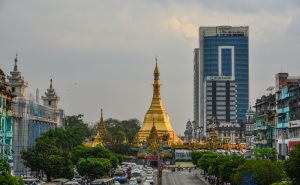Myanmar’s opposition National Unity Government (NUG) has denounced the military’s announcement that it will begin enforcing a 2010 military conscription law, vowing to resist its implementation.
In a statement yesterday, the NUG, which is coordinating the nationwide resistance to the military junta, said that the February 10 announcement was “unlawful and has no legal effect.”
“The public is not required to comply with it,” it stated, “The terrorist military junta is an illegal organization with no legal authority. It cannot enact, activate, or enforce any laws.”
On February 10, the military administration said that it would begin implementing the People’s Military Service Law, which has lain dormant since its passage in 2010. Under the law, men aged 18-45 and women aged 18-35 can be drafted into the armed forces for two years, a period extendable to five years during national emergencies.
The administration has now reportedly appointed the defense minister to lead a newly-formed Committee for Conscription, with an eye to starting recruitment in April, junta spokesperson Zaw Min Tun told BBC Burmese yesterday. The military will begin with an initial conscription of 5,000 people, he added.
The activation of the law is a clear response to a series of significant battlefield losses for the military junta over the past four months. The biggest losses have taken place in northern Shan State, where a coalition of armed resistance groups launched a surprise offensive in late October, seizing numerous towns and border crossings with China. The Arakan Army continues to make inroads in Rakhine State, in Myanmar’s west, where the military’s position continues to erode.
In its statement, the NUG said that the activation of the law was a reaction to these “significant and humiliating defeats.” The junta “now seeks to force Myanmar civilians to fight and to serve as human shields in a horrific war of its own making against its own people,” it added.
The NUG promised that “in collaboration with allied organizations, will take all necessary measures to prevent the junta’s attempted roll out of forced conscription and will address dangers faced by the public. Assistance will be provided, and further announcements will be made as required.”
The promise is the NUG’s attempt to deepen its legitimacy by extending its protection over potential recruits, many of whom would be understandably terrified of forced military service, given the Myanmar army’s history of pressganging civilians and convicts into military service, as minesweepers, combat porters, and de facto human shields. The NUG and the various armed groups associated with it are also likely to benefit from an influx of recruits as young people seek to evade recruitment.
Yesterday, Nikkei Asia published an article based on interviews with more than 30 people in Myanmar and an analysis of some 100 social media posts by potential conscripts. It reported that the “responses to the announcement were overwhelmingly negative – even among those who said they would comply. Many said they would consider fleeing the country or joining a resistance force rather than submit to conscription.”
It is reasonable to assume that whatever the military gains in terms of recruits will be matched, or exceeded, by the number of people who simply choose to leave the country, swelling further the floating population of Myanmar workers in neighboring Thailand. Conscription may also push many to join one of the many resistance organizations and turn their guns on a hated regime. However it is implemented, the conscription drive will further polarize the country and likely extend the conflict into the few regions of the country that have yet to be directly touched by it.
David Scott Mathieson, a long-time observer of Myanmar, told Australia’s ABC News that the junta’s activation of the conscription law was less a cry of desperation than “a pronouncement of psychotic resolve to take the entire country down with them.”
“This isn’t an indication of imminent collapse,” Mathieson added, “but a clear warning that the conflict could consume the entire country.”





























